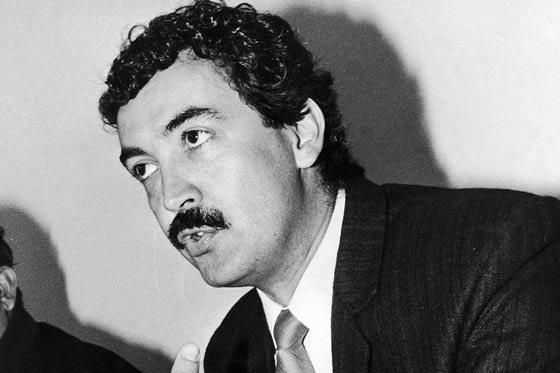by Jarrett Hoffman

“He was part of a whole political party that was exterminated one by one,” Castro said during a recent interview. “Estimates range from 3,000 to 5,000 people.”
Among all the killings, that one in March of 1990 left the biggest mark on Castro. “He was a very charismatic leader who was picking up more and more steam,” the musician said of Jaramillo. “I remember that I was very shocked and disturbed.” Years later, after seeing a documentary, he decided to write a piece in homage to that leader.
The new music ensemble Alia Musica Pittsburgh, which Castro directs and conducts, will perform his Memoria for soprano, violin, cello, guitar, and percussion this Sunday, October 27 at 7:00 pm at the Bop Stop. The free program also includes works by John Arrigo-Nelson, James Ogburn, Kerrith Livengood, and Bowling Green faculty composer Marilyn Shrude, and will serve as the season opener and kickstarter launch for the Cleveland Uncommon Sound Project.
Even after deciding to write Memoria, it took Castro years to get around to doing it. “In retrospect, I think that was a good thing,” he said. “I might not have done justice to the idea until I was more experienced.”
The right time came in 2015, when Chicago-based Ensemble Dal Niente commissioned the work for their tour of Latin America, which included a stop in Bogotá. That year also marked 25 years since the murder of Jaramillo. And on top of that, negotiations were underway to end the complicated, decades-long conflict in Colombia that had claimed so many lives, including that of the politician. “Everything aligned, and I thought, OK, this is the moment to write the piece,” Castro said.
Jaramillo’s last words, spoken to his wife, were an important inspiration for the work:
Mi amor, no siento las piernas. Estos hijue***** me dieron, me voy a morir. Abrazame y protegeme.
(“My love, I don’t feel my legs. These mother******* got me, I am going to die. Hug me and protect me.”)
“The very first sentence — ‘I can’t feel my legs’ — shows someone realizing that he’s going to die and putting it in a very physical, immediate way,” Castro said. “The second one goes out of the purely physical into more or less a reading of the whole situation. And then he goes on to say goodbye to his wife.”
The Spanish text includes excerpts from interviews and speeches by Jaramillo, as well as those dying words, and should be projected during the performance. “I think that’s a powerful thing,” Castro said. “It’s more immediate than reading it off a sheet of paper.”
But the expletive presented an issue. “I didn’t want to edit it out,” Castro said. “It’s part of the situation and part of the testimony. On the other hand, it’s tricky because it could become too shiny of an object in a piece.”
In the end, solving that “almost mundane problem” resulted in a key feature of the piece: a section of whispering. “As the soprano holds over the previous note, the ensemble whispers the word,” Castro explained. That section follows a big build-up and an explosion of sound. The composer noted that some have interpreted that as sonic gunshots, though he didn’t have that meaning in mind.
Recalling the premiere in Bogotá in front of a Colombian audience, Castro remembers one moment in particular: the silence after the end of the piece.
“There are other pieces of mine that I hold dear purely musically,” he said. “I’m not yet ready to say that Memoria is better, but I think it’s at least my most powerful and most successful piece. Certainly it communicates with the audience in a different and very impactful way.”
More details about Sunday’s program are available here.
From noon to 2:00 pm before the concert, the Cleveland Uncommon Sound Project will host a free reading session of music by area college students who were selected through a call for scores: Chris Neiner (Cleveland Institute of Music), Steven Beck (Kent State University at Stark), and Tempest Baum (Oberlin Conservatory).
You can read more about the assassination of Bernardo Jaramillo Ossa in a 1990 article in The New York Times.
Published on ClevelandClassical.com October 22, 2019.
Click here for a printable copy of this article



